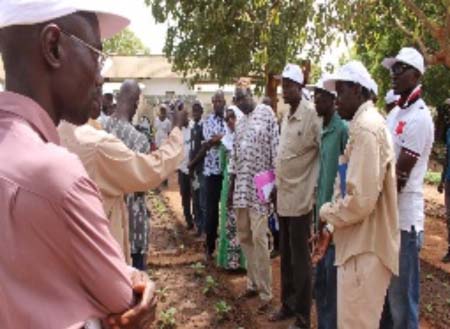
This remark was contained in a statement delivered on her behalf by the assistant FAO country representative and Head of Programmes, Mariatou Njie, on Tuesday at the Agriculture Rural Farmer Training Centre (ARFTC) in Jenoi, LRR, where she witnessed a demonstration on the farmer field school methodologies.
The Training of Trainers (ToT) exercise jointly organised by the department of agriculture and the FAO (under the MDG1c and FASDEP projects) is being attended by 34 extension workers drawn from across the country and staff of the MDG 1C Project.
The three-week synergy is aimed at raising participants’ awareness on the field school concepts, methodologies and best farming practices, as well as promoting their adoption by farmers for improved agricultural production and productivity.
Dr Kalala cited structural constraints including weak research and extension systems leading to adoption of poor farming practices as a key factor affecting agricultural productivity in The Gambia.
She, however, noted that this type of training would improve service delivery and boost production and productivity.
She restated FAO’s commitment to the country’s aspirations in agriculture, saying the agency’s mandate and interventions are in line with government’s policies, as well as the initiatives of The Gambia government.
Dr Kalala emphasized the need to adopt a uniform and standard training manual, as well as a unified approach in disseminating the farmer field school concept and methodologies in the country for the achievement of the desired impact.
She praised the Department of Agriculture and FASDEP for their tremendous support of the Farmer Field School initiative, while calling for the momentum to be sustained.
She also applauded participants’ commitment to the training and encouraged them to share the knowledge gathered with their fellow extension workers and farmers in general.
The Governor of LRR, Salif Puye, lauded the organizers of the training, saying the initiative has the potential to help address the perennial problem of low yields that farmers are grappling with as a result of soil infertility.
He said the FFS initiative which seeks to train farmers on good farming practices including the use of local materials to make compost, as well as Integrated Pest Management is cost-effective, apt and timely as the quest for national food self-sufficiency intensifies.
Governor Puye also cited pests and lack of market for agricultural produce as a challenge calling for concerted efforts and partnership to address the problem in a sustainable way.
An agronomist at the FASDEP project, Mbemba Danso, underscored the need for extension workers to take the lead in actualizing the president’s agricultural initiatives.
He said compost could help address the problem of low soil fertility and its associated effects.
Mr Danso hoped that more agricultural projects would embrace and promote compost making to boost production and productivity and thus, alleviating poverty, food insecurity and malnutrition.
The Lead consultant for the FFS training, Jennifer Hire, explained that at the end of the training, each participant would train 30 people as facilitators to help accelerate the scaling up of the initiative across the country.
Delivering the vote of thanks on behalf of the Regional Agricultural Director for LRR, a horticultural specialist, Modou Lamin Darboe, who is responsible for LRR also welcomed the initiative, noting that it would help to eradicate poor farming practices in the country.
Mrs Mariatou Njie, Governor Puye and other dignitaries were introduced to the new technology by participants.
They were briefed on how to prepare compost and control pests using organic material.
Read Other Articles In Article (Archive)
All Set for Queen's Baton Visit
Oct 30, 2009, 12:37 PM
2012 Youth Summer Camp Commences
Aug 27, 2012, 12:09 PM


